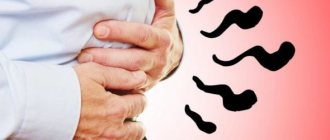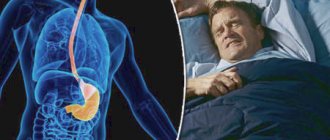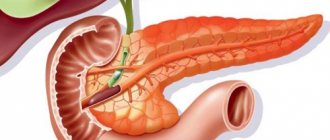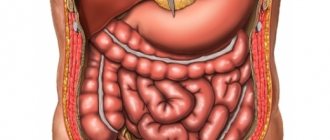Bloating, burping, and passing gas are natural byproducts of carbohydrate breakdown. Sometimes such manifestations can signal improper functioning of the digestive system.
You should know that lifestyle and eating habits greatly affect the functioning of the gastrointestinal tract.
Gas, bloating and burping are the visible and audible effects of poor digestion. When a person consumes carbohydrates, some of them remain undigested, and in this form they are sent to the large intestine, where intestinal bacteria begin to actively process them.
Bloating in men
Causes of Frequent Passing of Gas
Passing gas after bloating rarely appears in the morning. As a rule, they grow during the day and intensify in the evening. Determining the causes of bloating is not always easy. However, experts believe that the whole point is in the ingredients that have not been treated with digestive enzymes. The resulting chemical reaction contributes to the release of odorous gases, which consist of carbon dioxide, hydrogen, methane and nitrogen.
The air that comes in while eating and drinking provides an oxygen mixture that facilitates fermentation and increases the amount of gas produced. When there is too much of it in the stomach and intestines, bloating and excessive gas production occurs.
Causes of flatulence
Bacteria produce gas when they digest foods, primarily sugars and polysaccharides (eg, starch, cellulose), that were not digested during passage through the small intestine. Starch is a common cause of intestinal gas. Starches are polysaccharides that consist of long chains of sugar. Sources of starch: wheat, oats, potatoes, grains and rice. Rice is the most easily digested starch, and only a small amount of undigested starch from rice reaches the large intestine and colonic bacteria. Accordingly, consuming rice produces little gas. The following types of foods contribute to increased gas formation.
Whole grains produce more gas than the starch in refined grains. Certain fruits and vegetables, such as cabbage, also contain poorly digestible starches that reach the large intestine and cause gas. Most vegetables and fruits contain cellulose, another type of polysaccharide that is not digested at all and passes through the small intestine. However, unlike sugar and other starches, cellulose is used very slowly by colonic bacteria. Therefore, gas formation after eating fruits and vegetables is usually not significant unless the fruits and vegetables contain sugar or polysaccharides other than cellulose.
Small amounts of air are continuously swallowed and the bacteria continually produce gas. Contractions of the intestinal muscles usually move gas through the intestines and expel it. Flatulence prevents gas from accumulating in the intestines. However, there are two other ways in which gas can escape the intestines. First of all, it can be absorbed through the intestinal mucosa into the blood. The gas then enters the bloodstream and is eventually released through the breath. Secondly, the gas can be removed and used by certain types of bacteria within the intestines. In fact, more of the gas that is produced by bacteria in the intestines is removed by other bacteria in the intestines.
Excessive gas production: Excessive gas production by bacteria is a common cause of non-persistent abdominal distension. Bacteria can produce too much gas in three ways. First of all, the amount of gas that is produced by bacteria varies from person to person. In other words, in some people the bacteria produce more gas. Second, there may be poor digestion and absorption of food in the small intestine, allowing more undigested food to reach bacteria in the intestine. The more undigested food that reaches the bacteria in the large intestine, the more gases they produce. Third, bacterial overgrowth may occur in the small intestine. Under normal conditions, the bacteria that produce gas are limited to the large intestine. In some medical conditions, bacteria spread into the small intestine. When this happens, the food reaches bacteria before it can be fully digested and absorbed in the small intestine. Therefore, bacteria in the small intestine have enough undigested food to form gas. This condition in which gas-producing movement of bacteria into the small intestine is called small intestinal bacterial overgrowth.
Excessive production of gas by bacteria is usually accompanied by severe flatulence. Increased flatulence, however, may not always occur, as the gas can potentially be eliminated through other pathways in the body. Physical obstruction: An obstruction (blockage) can occur virtually anywhere from the stomach to the rectum. When the blockage is temporary or not significant, it may cause a non-permanent abdominal distension. For example, ulceration of the duodenal bulb can impede access from the stomach to the intestines, thereby blocking complete gastric emptying. After eating, the stomach is usually filled with food and air; over the next hour or two, the stomach acid mixes with the food and digestion occurs. As a result, the stomach inflates.
An obstruction in the small intestine, which usually occurs due to the formation of adhesions after surgery, is another cause of non-permanent abdominal distension. Finally, severe constipation or fecal impaction (hardened stool in the rectum) can also obstruct the flow of intestinal contents and lead to distension. Functional obstruction: Functional obstruction is not caused by an actual physical blockage, but rather by poor functioning of the stomach or intestinal muscles that move intestinal contents. When these muscles don't work normally, intestinal contents build up and bloat the belly. Causes of functional obstruction include: gastric paralysis, ; chronic intestinal pseudo-obstruction, an unusual condition in which the muscles of the small intestine do not work; and Hirschsprung's disease, in which a small area of intestinal muscle does not contract, usually due to missing nerves.
Fats in food have an effect on the intestines that mimics a functional obstruction. Fat reaching the small intestine slows the transport of digested food, gas and liquid within the intestine. This can allow food, gas and fluid to accumulate and lead to bloating and/or distension. Fibrous foods can cause bloating without increasing gas production in the intestines. This feeling of bloating (and perhaps even distension) is believed to be caused by the slow passage of gas through the intestines that is caused by fiber. Intestinal hypersensitivity: Some people may be very sensitive (hypersensitive) to intestinal distension. The bloat may get worse or even progress to sprain.
The patient's medical history is important. If the sprain is permanent, then expansion of the abdominal organs, fluid accumulation in the abdomen, tumor or obesity are likely causes of its development. If stretching is associated with increased flatulence, then bacteria and excessive gas production are likely factors. If a person consumes large quantities of milk or dairy products (lactose), sorbitol or fructose, these sugars can cause sprains.
When people complain of flatulence, it is necessary to clarify how many times they pass during the day. If a person rarely overeats, then the problem probably won't be too much gas. For example, the problem may be a foul odor of gas (usually due to sulfur), an inability to control or control the passage of gas, or soiling of underwear with small amounts of stool when passing gas. All of these problems, like excessive gas, are socially embarrassing and may prompt people to consult a doctor. These problems, however, do not occur due to excessive gas production and their treatment is excellent.
Why do gases collect in the intestines?
The passage of gas is a consequence of swallowing air (aerophagia) when eating, smoking or drinking carbonated drinks. Increased aerophagia may be associated with gastrointestinal disorders, such as gastroesophageal reflux disease, irritable bowel syndrome, and so on.
Swallowed air leaves the body more easily in a standing position, therefore, there is an incentive to walk after eating. When a person lies down, the air quickly enters the stomach and is then pressed into the duodenum. The circumference of the abdominal cavity increases, which causes the body to become bloated.
Bloating and frequent gases are a sign of poor digestion
Excess gases in the intestines increase the pressure in the abdominal cavity, the diaphragm rises, and the next symptom of indigestion may be heartburn, bitterness in the mouth, sour belching due to the accumulation of stomach contents in the esophagus. If bloating is not a disorder of the intestines, then the release of gases brings relief to a person.
Causes of belching
Excessive accumulation of air in the abdomen is not the only cause of burping. For some people, belching becomes a habit and is not a sign of air accumulation in the stomach. For others, belching is a response to any discomfort in the stomach and more, which occurs due to the accumulation of gases. Everyone knows that when moderate abdominal discomfort occurs, frequent belching reduces the problem. Excessive air accumulation in the abdomen is a common cause of moderate discomfort. As a result, people belch whenever they feel mild abdominal discomfort, regardless of the cause. Belching is not a simple act, as many people think, and requires coordination of some actions.
The larynx should be closed so that any liquid or food that might return with air from the stomach does not enter the lungs. Raising the larynx relaxes the upper esophageal sphincter so that air can pass more easily from the esophagus into the throat. The lower esophageal sphincter should open so that air can pass from the stomach into the esophagus. While all this is happening, the diaphragm moves down, just as it does when a person breathes. This increases abdominal pressure and decreases chest pressure. Changes in pressure propel the flow of air from the stomach to the esophagus in the chest.
If the problem causing discomfort is not excessive air in the stomach, then belching does not provide relief. When belching does not relieve discomfort, it should be considered a sign of problems within the gastrointestinal tract, and the cause of the discomfort must be determined. Belching alone, however, does not help the doctor determine what may be wrong because it can occur with virtually any abdominal disease or condition that causes discomfort.
When discussing bloating, it is important to distinguish between bloating and distension. Bloating is the subjective sensation (feeling) that the stomach is larger than usual. In contrast, a distension is an objective determination (physical detection) that the abdomen is actually larger than normal. A sprain can be identified by observations such as an inability to fasten clothing. In some cases, the bloat may represent a mild form of distension, since the abdomen has not become physically (obviously or to some extent) enlarged. However, it should never be assumed that bloating is the same as stretching.
There are three ways in which an abdominal strain can occur. Causes include an increase in air, fluid or tissue within the abdomen. Diseases or conditions can cause an increase in any of these three factors. Therefore, it is important to determine which of the reasons led to abdominal distension. There are two types of sprains: permanent and non-permanent. Persistent distension can be caused by an enlarged abdominal organ, an intra-abdominal tumor, fluid accumulation around the abdominal organs (ascites), or just simple obesity. Non-permanent distension usually occurs due to the accidental accumulation of gas and/or fluid within the stomach, small intestine, or large intestine.
What should I do?
If a person experiences constant abdominal pain or cramps in the intestines for several hours after eating, then it is necessary to notify the local doctor or gastroenterologist. As a rule, with such symptoms, the treating consultant prescribes laboratory blood tests, abdominal and ultrasound examinations of the abdominal cavity. The results obtained allow us to determine whether the digestive tract is healthy and whether parasites are present in it.
Overeating contributes to impaired intestinal motility
It should also be remembered that excessive gas may be the first sign of digestion and absorption disorders, and bloating may be a sign of pancreatic enzyme deficiency, intestinal inflammation and/or cysts, as well as celiac disease, a multifactorial digestive disorder.
If diagnostic tests do not confirm the presence of systemic gastrointestinal diseases, then a common source of the problem is poor nutrition.
Symptoms
A person feels discomfort associated with the filling of the stomach with gases. Belching can sometimes be very unpleasant and painful. Added to this are nausea, a burning sensation in the chest, constipation, and loss of appetite. Heartburn occurs when stomach acid begins to irritate the walls of the organ.
Another sign of problems in the digestive system is pain. As a rule, it is dull, although cutting and stabbing pains often appear. Again, soreness may be accompanied by vomiting.
Interesting! Immediately after eating, bloating appeared - the main reasons
What foods increase gas formation?
People who often suffer from flatulence should avoid gas-generating foods that contain:
- Polysaccharides.
- Lactose.
- Some soluble fiber.
- Starch.
Polysaccharides are found in beans, broccoli, Brussels sprouts, cauliflower and white cabbage, dry peas and lentils. Lactose present in dairy products can increase gas production by 8 times. Soluble fiber, such as beta-glucans in bran or pectin in apples, may pass into the colon partially undigested by the stomach. Undigested starch, entering the large intestine, also becomes a breeding ground for gas-producing bacteria.
Grain products that increase gas production
Wheat, oats, corn, potatoes and even simple bread or pasta can cause similar problems in the digestive system. In this regard, rice is the safest grain. Even vitamin C can lead to flatulence and gas if taken more than 500 mg per day. Therefore, it is better to eat more citrus fruits and peppers, because natural vitamin C does not cause obvious discomfort in the intestines.
Main symptoms
The main function of the human digestive tract is the processing and promotion of food mass. Therefore, any organ of the gastrointestinal tract, except the digestive glands, has a transit purpose, an entrance and an exit. The stomach is a hollow organ through which the passage of food mass is ensured by inlet and outlet valves. Their muscle tone is complexly regulated by the central nervous system (CNS) and the acidity level of the stomach contents (which is ultimately also regulated by the CNS).
Simply put, the task of these valves is to retain food in the stomach until it is adequately saturated with gastric juice and the absorption of water, salts and alcohols. Therefore, gas formation in the stomach is a symptom of fermentation processes, which under normal physiological conditions should not occur there, since the stomach does not have a natural bacterial flora.
Normal intestinal function, on the contrary, is impossible without a complex balance of activity of pathogenic and beneficial bacteria, which together make up the intestinal flora. Intestinal function is closely related to gas formation, which accompanies most of the biochemical reactions occurring there. Under normal conditions, excess gases are removed naturally.
The accumulation of gases in the digestive tract, which has become pathological, is a consequence of microbiological imbalance and (or) a decrease in intestinal excretory capacity for various reasons.
Garlic and ginger reduce gas formation
If, when preparing dishes, you add garlic or ginger to foods that cause increased gas formation in the intestines, this will somewhat reduce the problem of bloating in the stomach, since these aromatic spices deprive vegetables of their explosive properties.
Ginger and garlic are good for digestion
To avoid flatulence, it is worth noting that the body must determine at what time and after what foods problems arise. This is not always enough to exclude them from the menu. Sometimes the body needs help with medications or herbs. Measures that lead to the collapse of gas bubbles formed in the stomach and intestines are highly recommended.
Treatment
Where to start and how to get rid of gases? The treatment is complex and consists of several stages:
- dietary food, without fatty, spicy, sour foods; Enzyme preparations will help cope with the problem of bloating
- the use of drugs containing enzymes (“Pancreatin”, “Mezim”);
- medications are prescribed to reduce pain, choleretic agents;
- acidity correcting drugs.
The treatment process is not quick, the patient needs to be patient and treat the complication under the strict supervision of a specialist.
We found the culprit of the condition, which means we solved the problem. But in most cases, it all starts with nutrition. A healthy lifestyle and healthy foods are an excellent prevention of diseases of the digestive system.
What to do to avoid flatulence and increased gas formation?
First of all, you need to learn and follow a few simple rules of proper nutrition:
- You should eat small portions 4-5 times a day.
- To facilitate digestion processes. It is necessary to chew every piece of food thoroughly.
- Raw vegetables and fruits are recommended to be consumed in the first half of the day.
- All dishes must be heat treated, steamed or boiled.
- New foods should be introduced into the diet in small quantities to see how the body reacts to them.
- Avoid heated and artificially colored foods, as well as canned foods.
- If you smoke, you should not do this before eating.
To improve digestion, you should drink 2 liters of water daily - Drink approximately 2 liters of fluid per day in small portions, preferably between meals.
- Do not wear too tight or tight-fitting clothes, both outer and underwear.
- Exercise daily to help combat flatulence.
Power supply errors
Severe eating disorders can rightfully be classified as bad habits that cause persistent disturbances in the gastrointestinal tract, and they are as follows:
- immoderation and indiscriminate eating;
- abuse of salty, fried and fatty foods, which suppress peristalsis;
- manic addiction to fast food;
- hasty eating, leading to insufficient chewing of food;
- unjustified unbalanced diets, ill-organized fasting;
- predominant consumption of food that has undergone deep industrial processing - canned food, frozen semi-finished products;
- unjustified use of antibacterial drugs that can cause irreparable harm to the body.
Note! An important indicator of good bowel function is stool regularity.
Simultaneous consumption of incompatible foods, mixing raw and cooked foods, sweet desserts immediately after meals - all these factors increase the likelihood of belching and increased intestinal gas formation.
Intolerance to a number of food products is caused by the absence or insufficient production of digestive enzymes necessary for their processing and absorption, as well as allergic reactions.
Exercises for bloating
Simple physical exercises can help combat bloating and increased gas production:
- Lying on your back, you need to raise your knees to your chest and slowly rock your back up and down.
- Without changing the starting position, one leg is bent at the knees, the other is straightened. It is necessary to touch your nose with your knee and hold the position for 1-2 minutes. Repeat the exercise several times with each leg.
- Alternately pressing the right and left legs to the chest while lying on your back.
This complex of home exercises for bloating and gas should be done 2 times a day for 10-15 minutes, 2-3 hours before meals. Take care of yourself and always be healthy!











